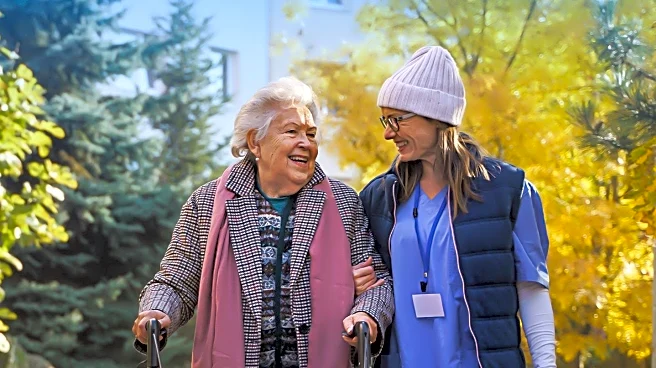What's Happening?
Caregivers across the United States are sharing their experiences and advice on managing the demanding role of caring for ill or elderly adults. According to a recent collection of stories, nearly 600
caregivers have contributed their insights, emphasizing the importance of seeking help and setting boundaries. Many caregivers describe the role as a marathon rather than a sprint, highlighting the need for sustainable self-care practices. These practices include protecting mental and physical health, often by setting boundaries and forgiving oneself for not meeting every demand. The stories also address the changing dynamics in relationships as caregivers take on new roles, which can be challenging to navigate. The advice shared aims to help caregivers cope with both stable periods and times of crisis, offering practical tips for enduring the emotional and logistical challenges of caregiving.
Why It's Important?
The insights shared by caregivers are crucial for understanding the broader impact of caregiving on individuals and families. Caregiving can be isolating and overwhelming, affecting mental health and personal relationships. By sharing strategies for seeking support and managing stress, caregivers can improve their well-being and effectiveness in their roles. This collective wisdom is particularly important as the U.S. population ages, increasing the demand for caregiving. The advice also highlights the need for systemic support, such as accessible healthcare resources and community support networks, to alleviate the burden on caregivers. Understanding these dynamics can inform public policy and healthcare practices, ensuring that caregivers receive the necessary support to maintain their health and provide quality care.
What's Next?
As the caregiving community continues to grow, there may be increased advocacy for better support systems and resources. Caregivers might push for policy changes that provide more comprehensive healthcare coverage and support services. Additionally, there could be a rise in community-based initiatives aimed at connecting caregivers with local support groups and resources. These developments could lead to improved mental health outcomes for caregivers and better care for those they support. Stakeholders, including healthcare providers and policymakers, may need to address these needs to prevent caregiver burnout and ensure sustainable caregiving practices.
Beyond the Headlines
The stories shared by caregivers reveal deeper societal issues related to aging and healthcare. The emotional toll of caregiving can lead to significant changes in family dynamics and personal identity. As caregivers navigate these challenges, there is a growing recognition of the need for cultural shifts in how society views and supports caregiving roles. This could lead to increased awareness and appreciation for the work caregivers do, as well as more inclusive policies that recognize the diverse needs of caregivers and those they care for.










